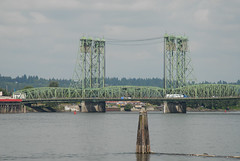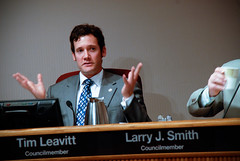
implications for how we
cross I-5 in the future.
(Photos © J. Maus)
This Friday, the Columbia River Crossing (CRC) project will be put to a crucial test. At a meeting of the Project Sponsor’s Council, CRC staff will present the council members — which include Department of Transportation directors and mayors from both Vancouver and Portland — with a new proposed bridge design that reflects “refinements” that have taken $650 million off the project’s estimated cost.
The revised proposal has garnered support from some legislators, who see the project as a much-needed jobs stimulus. That might give CRC staff and other supporters of the project a feeling of renewed momentum for a project that has been dogged by controversy and eroding political support for months.
A protest action against the project by the grassroots Stop the CRC! coalition is expected to happen during the Sponsor’s Council meeting and several major environmental and transportation advocacy groups have called for a complete re-boot of the project.
The Bicycle Transportation Alliance (BTA) is not impressed with the revised design. They’re encouraging their members to attend the Stop the CRC! protest and they’ve lent support to the activists behind it. The BTA’s Michelle Poyourow says the cost reductions have been nothing more than symbolic. “We need a set of real choices of how to fix I-5, not a false choice of nothing at all or this gargantuan project.” Poyourow says they want the Sponsor’s Council to take a step back, re-evaluate the goals of the project — like moving more people across the river, reducing greenhouse gas emissions and reducing congestion — and “start again.”
She says the DOT directors from Washington and Oregon — both of whom are key supporters of the project — are focused too much on highways. “They’re experts on highways, but some of the solutions that may get us to the outcomes everyone wants, might not have to do with the highway.”
Portland Mayor Sam Adams is on the Sponsors Council. His Transportation Policy Advisor Catherine Ciarlo told us this morning that he’s currently getting an in-depth look at the refined CRC design. While Ciarlo says Adams “remains really determined to see the goals of the project used to make decisions about what gets cut,” she also added that Adams is aware of “consternation” about how the new proposal impacts Hayden Island residents (they’re rallying to save their Safeway that would be lost if the current design gets built).
Ciarlo maintains that Adams’ main objective is to make sure we get the “right project,” which by her definition is a project that is the “least expensive, most effective way to achieve our goals.” The goals Ciarlo refers to are a set of performance measures Adams won support for in the project as part of a compromise for his vote in support of a 12-lane bridge back in March.
Sitting across from Adams on the Sponsor’s Council is Metro President David Bragdon. Ciarlo says Bragdon and Adams have been working closely together to “make sure the right project gets built.” Bragdon has a much different opinion on the CRC project than his predecessor on the council Rex Burkholder. Back in October, Bragdon released a statement that said, “The sooner we all acknowledge that the jumbo version would be harmful to our region and unaffordable to toll-payers and taxpayers, the faster we can get on with building something that works.”
‘Something that works’ must include tolls, but another member of Sponsor’s Council, newly elected Vancouver Mayor Tim Leavitt, won his campaign based in large part on his opposition to them.
Will opposition to the project, growing discontent by Adams and Bragdon, and Leavitt’s self-induced rock-and-a-hard-place political position all add up to the wheels coming off of the CRC? Or will $650 million worth of cuts be enough to make it a palatable project to the powers-that-be?
BTA staffer Michelle Poyourow thinks the cutbacks recently made to the project “show that community opposition to highway expansion has real power” and she feels several members of the Project Spnosor’s Council are hearing that message loud and clear. Poyourow seems optimistic about Friday, adding, “It’s going to be really interesting.”
- CRC Project Sponsors Meeting
Open to the public
Friday, December 4th – 10:00 am to 12:00 pm
Port of Portland
121 NW Everett St.
Project Sponsor’s Council website
Stop the CRC! Protest Action
Meet at 9:30 am, 121 NW Everett St
More details here


